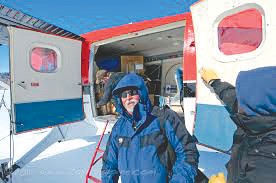Shown on ice in Antarctica, Jeff Vervoort, a 1972 Cook County High School graduate, is one of the geologists who is excited about the prospects of getting samples brought up by the Rapid Access Ice Drill that will bore nearly two miles into the ice and give scientists a look into the continent’s past.

He won’t get geological samples to study for nearly two years, but noted geological research scientist and Washington State University Assistant Professor Jeff Vervoort is excited about the prospect of working with his friend and colleague, John Goodge, a University of Minnesota Duluth professor who is heading up a research project aimed at gathering new information about what lies in the depths of Antarctica.
Goodge, an earth and environmental science professor at UMD, is a co-leader of a team that is using a new drilling system—Rapid Access Ice Drill (RAID)—that will dramatically reduce the time it takes to bore into the massive ice sheets and bedrock of Antarctica. This new mobile drill will allow scientists to drill several boreholes in one season, something that wasn’t possible before. It will also drill to a depth of 11,000 feet, far deeper than anyone has been able to drill at either of the poles.
Core samples will include ancient ice with air bubbles trapped inside that paleoclimatologists will study to get a grasp of past climate conditions. Researchers will also study ice floes that could go back over a million years. If geological samples are obtained, they will be examined to help determine how Antarctica fits with the other continents.
The $9 million project is funded through a grant from the Division of Polar Programs at the National Science Foundation.
“I hope to be collaborating with John on this project, once the geological samples become available,” said Vervoort from his Pullman, Washington home. “Right now the RAID project is still in the development/run-up phase…the new drill equipment was recently packed up on a ship and headed for New Zealand with the hope of getting it to the ice [McMurdo Station] yet this year. Next field season (Fall 2016) it will be transported up onto the ice sheet to begin some test drilling and to iron out the logistical challenges. The project until now—and continuing for the next year—has been one of engineering and project organization. This is an extremely ambitious project, one that John has taken the lead on. I have not been involved in this at all with the exception of attending a few meetings and being one of the allied scientists that will work on the samples when we get them. The earliest this will be is the field season after next—so about two years from now.”
At WSU, Vervoort directs the Radiogenic Isotope and Geochronology Laboratory. Inside this high tech clean lab, he and his research group analyze materials of every kind, everything from mud to meteorites. His fundamental interest as a scientist, he said, “is to understand the earth from the perspective of geochemistry. Radiogenic isotopes are important tools that enable us to understand how the earth formed and how it evolved through its history.”
Vervoort has worked in the Antarctic in the past, collaborating with the University of Minnesota –Duluth (UMD) on a previous project. He shared that information with readers of the New York Times on a science blog post.
Vervoort is a 1972 Cook County High School graduate. After high school he attended the University of Wisconsin in Madison, Wisconsin, where he obtained a degree in zoology. He followed that up with a Ph.D. in geology from Cornell University.
His parents are Virgil and Nancy Lindquist of Grand Marais.


Loading Comments